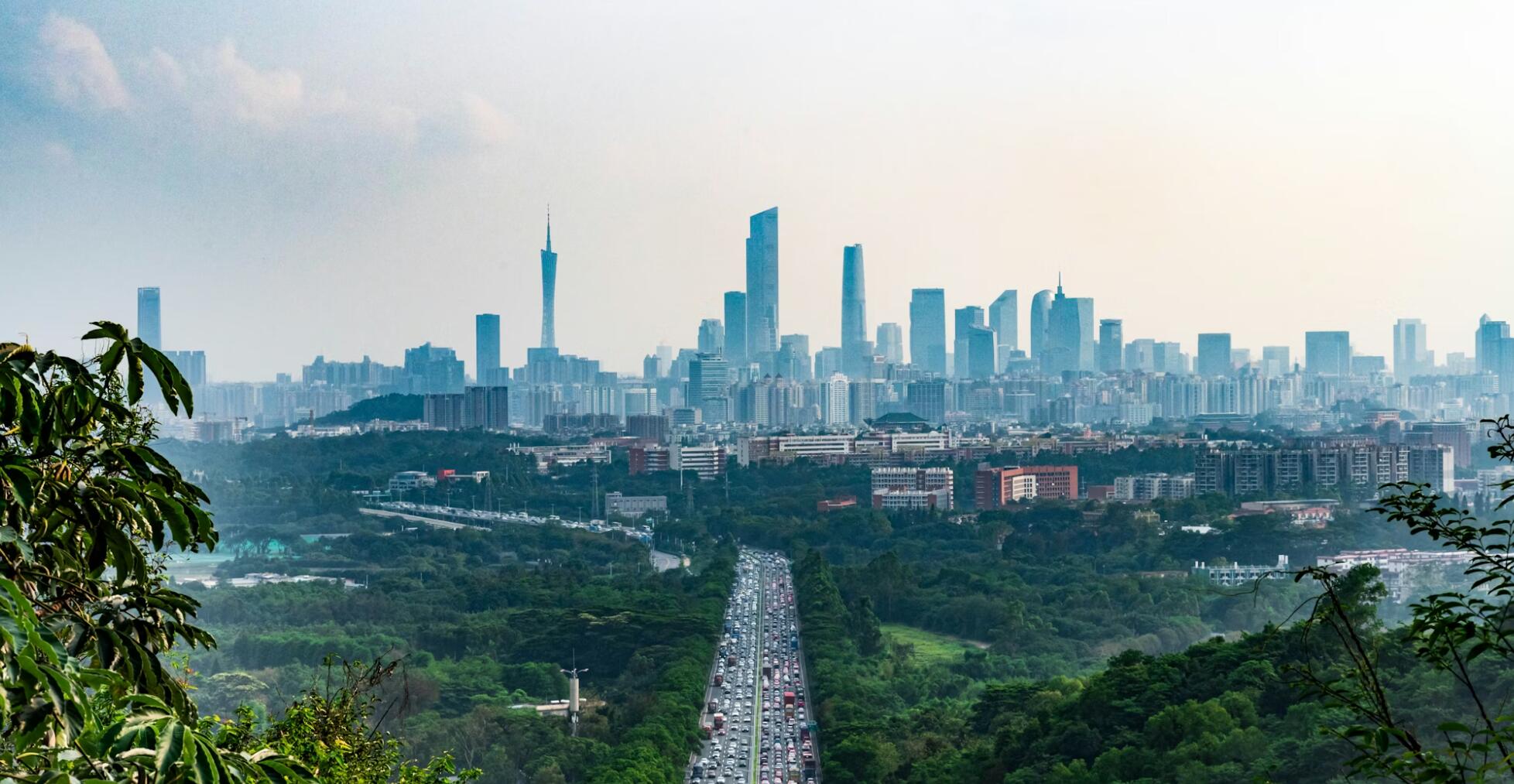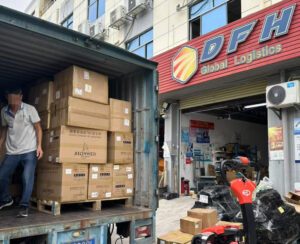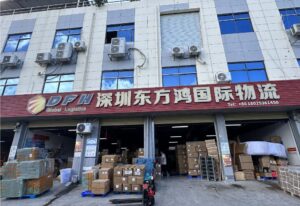Many importers sourcing from Guangzhou struggle with delayed pickups, weak consolidation, unclear fees, and customs issues because they choose the wrong freight forwarder. In this guide, I explain every shipping method from Guangzhou—air, sea, express, and DDP—and show you how to avoid the common problems that cost importers both time and money.
Guangzhou is one of China’s largest sourcing regions, with factories and wholesale markets covering Baiyun, Haizhu, Panyu, Tianhe, Huangpu, and the Canton Fair area. But even though this region is convenient for buyers, many importers face the same shipping challenges:
- Suppliers deliver goods at different times
- Factory packaging is weak and easily damaged
- Domestic trucking fees are high when the forwarder is not based in Guangzhou
- Export declarations are delayed due to incorrect HS codes
- DDP procedures are unclear and result in unexpected charges
- Communication with the logistics provider is slow or inconsistent
These issues directly affect delivery time, transportation cost, and customer satisfaction.
With more than twelve years helping importers ship from Guangzhou to the USA, Europe, Australia, Canada, and the Middle East, I’ve seen how the right freight forwarder can solve these problems and simplify the entire process.
What Is a Freight Forwarder in Guangzhou?
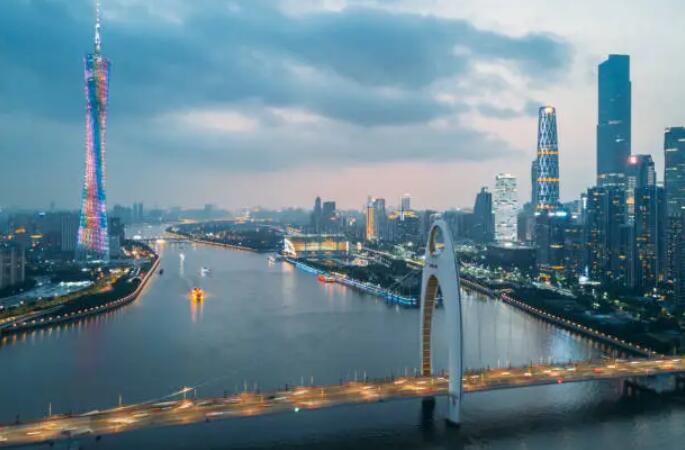
ALT: Guangzhou freight agent
A freight forwarder in Guangzhou is a logistics partner who manages your shipment from local suppliers to your final destination. Their role typically includes:
- Communicating with your suppliers
- Picking up goods from factories, markets, or warehouses
- Receiving and consolidating shipments
- Preparing export documents
- Booking international freight
- Handling customs clearance
- Delivering to your warehouse, home address, or Amazon FBA center
A Guangzhou-based freight forwarder is especially helpful because they work directly in the region where most sourcing happens. Their on-ground presence ensures smoother coordination with suppliers and more accurate handling of your goods.
The detailed advantages of choosing a Guangzhou-based forwarder are explained in the next section.
Why Do Importers Need a Freight Forwarder in Guangzhou?
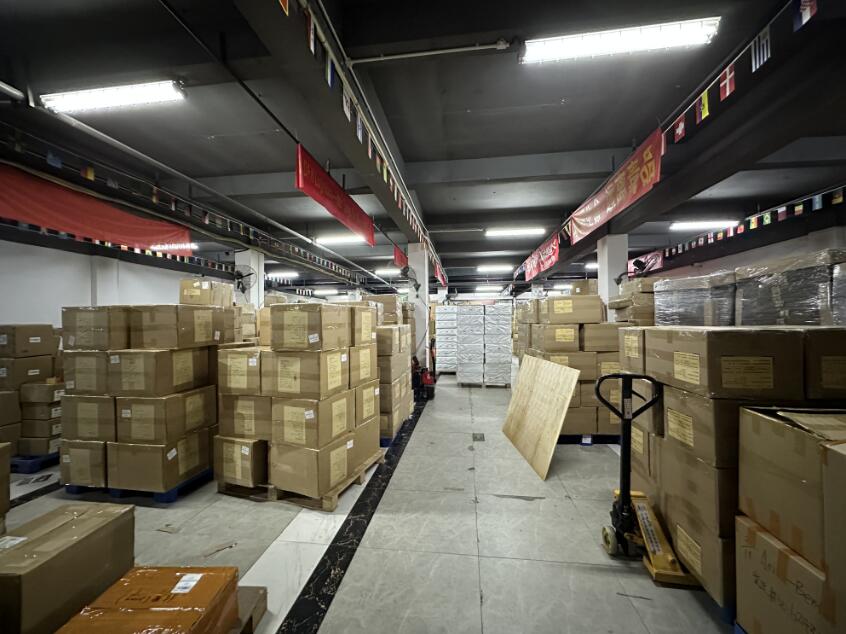
ALT: Guangzhou warehouse work
Guangzhou is a major sourcing hub, and working with a local freight forwarder provides several clear benefits that directly impact your shipping cost, timeline, and overall efficiency.
1. Proximity to Suppliers Means Faster, Cheaper Pickups
Most Guangzhou suppliers are located within short distance of major logistics hubs. This proximity provides:
- Faster pickups
- Lower domestic trucking cost
- Reduced risk of supplier delays
- Easier coordination with factories and markets
For importers purchasing multiple products from different suppliers, this makes a significant difference in efficiency and cost.
2. Better Multi-Supplier Consolidation
Guangzhou handles a wide variety of products, which means many buyers purchase from different factories. A local freight forwarder can:
- Receive goods from all your suppliers
- Check quantities
- Inspect packaging
- Strengthen weak cartons
- Combine shipments into one export package
- Provide photos or videos for confirmation
This results in safer packaging, smoother export declaration, and cheaper international shipping.
3. Local Export Customs Knowledge
Guangzhou has its own customs procedures. A forwarder located here understands:
- Required export documents
- Correct HS code usage
- Inspection requirements
- How to avoid declaration mistakes
This helps prevent delays or rejections during export.
4. More Stable Shipping Channels
Guangzhou provides strong options across all major shipping methods:
- Air freight via CAN airport
- Sea freight via Nansha and Huangpu ports
- Express hubs for DHL, UPS, FedEx, and SF
- Mature DDP channels to the USA, UK, Europe, Australia, and Canada
A local forwarder can select the best route for your shipment according to your time and budget requirements.
What Shipping Methods Are Available from Guangzhou?
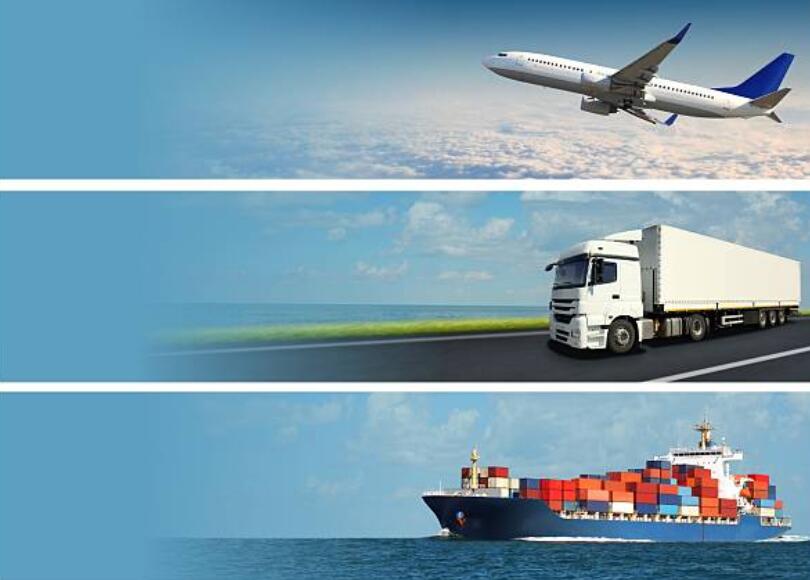
Different products, budgets, and delivery requirements call for different shipping solutions. Guangzhou is one of China’s most mature logistics hubs, so almost every international channel is available here. Before choosing a method, the key is to understand the strengths and limitations of each option and match them with your business needs.
Shipping Method Overview (Quick Comparison)
| Method | Transit Time | When to Use It | Typical Cargo Types |
|---|---|---|---|
| Air Freight | 4–9 days | When you need speed at a reasonable cost | Electronics, apparel, daily goods |
| Sea Freight | 15–40 days | When shipping large or heavy cargo economically | Furniture, machinery, bulk orders |
| Express Courier | 3–7 days | When timing is critical or cargo is small | Samples, accessories, high-value goods |
| DDP (Air/Sea) | 5–40 days | When you want a full-service, tax-included, hassle-free solution | E-commerce, FBA, small businesses |
Below, I break down each method based on real operation experience.
Air Freight from Guangzhou (CAN Airport)
Air freight is the method many importers choose when they want a balance of speed, stability, and reasonable pricing. Guangzhou Baiyun International Airport (CAN) is one of China’s largest air cargo hubs, with stable routes to major destinations. This makes Guangzhou extremely competitive in air freight—both in cost and flight frequency.
When Air Freight Makes Sense
Air freight is ideal when:
- Your goods must arrive within one to two weeks
- The shipment is too large for express but too urgent for sea
- You are shipping electronics, fashion items, small machinery, accessories, or seasonal products
- Your buyers expect stable and predictable delivery
In my experience, many importers underestimate how efficient Guangzhou’s airport is. For example, shipments to the USA often fly directly or with minimal transfer delays, keeping both transit time and cost stable.
Air Freight Transit Times from Guangzhou
| Destination | Transit Time |
|---|---|
| USA | 5–9 days |
| Europe | 4–7 days |
| Australia | 5–8 days |
| Middle East | 4–6 days |
Air freight is a strong option when you care about speed but don’t want to pay express courier prices.
Sea Freight from Guangzhou (Nansha and Huangpu Ports)
Sea freight is the backbone of large international shipments. If your cargo is bulky, heavy, or over 2–3 CBM, sea freight is usually the most cost-effective and scalable choice.
Guangzhou’s Two Main Ports
- Nansha Port
Deep-water, modern, ideal for FCL shipments - Huangpu Port
Convenient for LCL cargo and suppliers located closer to the city
When Sea Freight Makes Sense
Choose sea freight when:
- Your shipment is more than 2–3 CBM
- You’re shipping furniture, lighting, home goods, machinery, construction materials
- Cost is more important than speed
- Your business runs on planned inventory cycles, not urgent restocking
Sea Freight Transit Times
| Destination | Transit Time |
|---|---|
| USA West Coast | 15–22 days |
| USA East Coast | 28–35 days |
| Europe | 25–40 days |
| Australia | 15–22 days |
Sea freight requires more time, but with the right forwarder, the process can be extremely stable and predictable.
Express Shipping from Guangzhou (DHL, UPS, FedEx, SF)
Expres courier shipping—DHL, UPS, FedEx, and SF—is the fastest method from Guangzhou. This is why most importers use it for samples, urgent orders, small parcels, and high-value items.
Guangzhou is home to major express hubs, which means:
- More direct flights
- Faster handover from warehouse to airport
- Better pricing compared to some inland cities
When Express Is the Best Choice
Express is ideal when:
- You need delivery within 3–7 days
- You’re sending small quantities (1–50 kg)
- Your shipment has a high value or strict delivery deadline
- You need the simplest, most trackable method possible
Express Transit Times
| Carrier | Transit Time |
|---|---|
| DHL | 3–5 days |
| UPS | 4–6 days |
| FedEx | 4–6 days |
| SF Express | 5–7 days |
Guangzhou is also strong in electronics manufacturing, so many warehouses here support shipments containing batteries, power banks, and related items—something that’s not available in every city.
DDP Shipping and Amazon FBA Delivery from Guangzhou
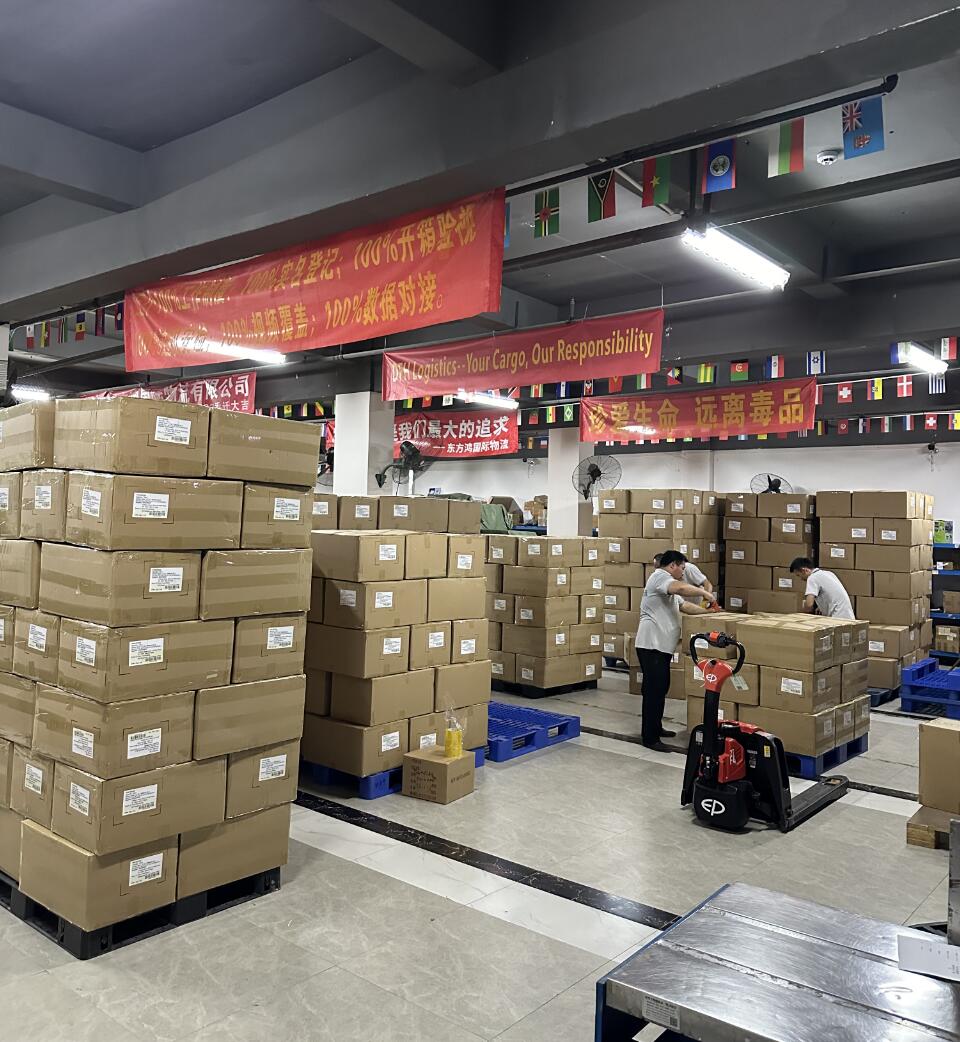
DDP (Delivered Duty Paid) has become the most popular method for Amazon sellers, e-commerce sellers, small businesses, and individual importers. It removes the most stressful parts of international shipping by including:
- Pickup
- Export declaration
- International freight
- Customs clearance
- Duty and tax payment
- Final delivery to your address or FBA warehouse
Why Importers Choose DDP
From my experience, importers choose DDP when:
- They don’t have a company or import license
- They don’t want to deal with customs clearance
- They need to know the total landed cost upfront
- They want a predictable, door-to-door solution
- They sell on Amazon, Shopify, Walmart, eBay, etc.
DDP is not just about convenience; it also reduces the risk of unexpected expenses or customs delays.
DDP Transit Times from Guangzhou
| Method | Transit Time | Best Use |
|---|---|---|
| DDP Air | 5–12 days | Small to medium shipments, electronics, fashion items |
| DDP Sea | 22–40 days | Large volumes, bulky items, furniture |
Amazon FBA Delivery
from Guangzhou
Guangzhou is one of the most convenient locations for FBA shipping.
We deliver directly to:
- USA FBA
- UK FBA
- EU FBA
- Canada FBA
- Australia FBA
And we manage:
- Carton labeling
- Preparation for FBA requirements
- Palletization
- Appointment scheduling
- Issue handling with Amazon receiving centers
For importers who want zero stress, DDP from Guangzhou is often the best choice.
How Long Does Shipping from Guangzhou Take?
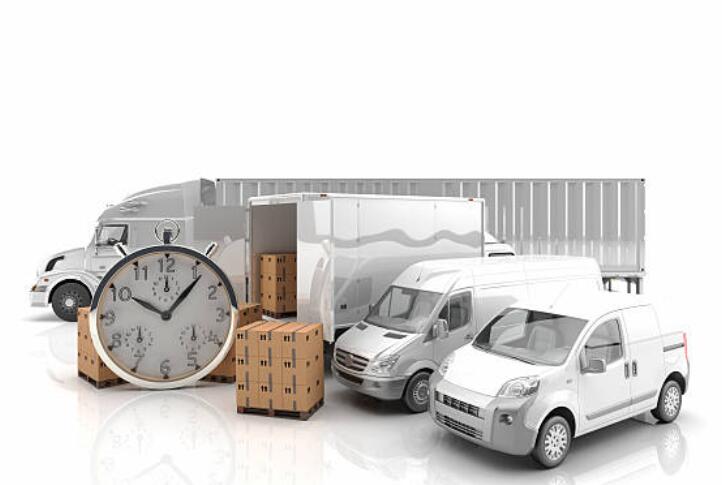
One of the most common questions importers ask me is about shipping time. After handling thousands of shipments from Guangzhou, I’ve learned that timing depends far more on the shipping channel than on the cargo itself. Fortunately, Guangzhou has some of the most stable air, sea, express, and DDP routes in China.
Here’s a realistic overview based on my daily operations—not theoretical numbers:
Average Shipping Time from Guangzhou
| Destination | Air Freight | Sea Freight | Express | DDP Air | DDP Sea |
|---|---|---|---|---|---|
| USA | 5–9 days | 15–35 days | 3–5 days | 7–12 days | 25–40 days |
| Europe | 4–7 days | 25–40 days | 3–6 days | 7–10 days | 28–45 days |
| Canada | 5–9 days | 25–40 days | 4–7 days | 8–12 days | 30–45 days |
| Australia | 5–8 days | 15–22 days | 4–6 days | 7–10 days | 20–35 days |
These ranges reflect actual operational experience. Weather, peak season congestion, and customs inspections can influence transit time, but overall, Guangzhou is one of the most predictable shipping origins in China.
What Factors Influence Shipping Costs from Guangzhou?
After years of helping importers build profitable sourcing pipelines, I can say with confidence that understanding cost drivers is essential. Many buyers focus on the freight rate alone, but the real cost structure is more nuanced.
Here are the factors that impact pricing the most:
1. Which Shipping Method You Choose
Each method has its own pricing logic:
- Air freight is billed by chargeable weight
- Sea freight LCL is billed by CBM
- Compressed express channels charge by weight or volume
- FCL follows seasonal market rates
- DDP bundles freight, tax, and customs into one figure
The biggest mistake I see from new importers is comparing these methods one-to-one without considering how differently they are calculated.
2. Dimensions and Carton Shape
For air freight and express, dimensional weight often matters more than real weight.
Oversized, long, or irregular cartons may be charged extra because they occupy more aircraft or container space.
3. Destination Address
Shipping to commercial addresses is usually cheaper.
Residential delivery in the USA, Canada, and parts of Europe often has additional handling fees.
4. Cargo Type
Some goods require special channels:
- Batteries
- Cosmetics
- Liquids
- Electronics
- Fragile items
Guangzhou has mature channels for electronics and battery-powered products, which is one of the reasons many buyers prefer shipping from this region.
5. Seasonality
Rates often fluctuate around:
- Chinese New Year
- Black Friday
- Christmas
- Q4 restock season
Planning ahead can save a significant amount of money.
What Warehouse Services Are Available in Guangzhou?
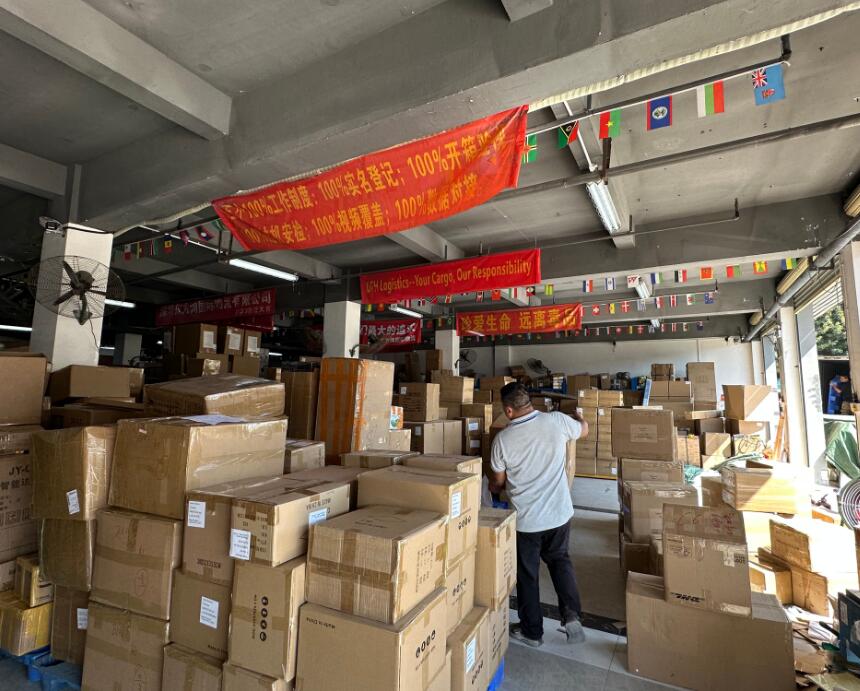
Because Guangzhou is such a large sourcing center, warehouse services play a critical role in ensuring shipments move smoothly. Over the years, I’ve designed our Guangzhou warehouse process to solve the exact problems importers run into—especially those buying from multiple suppliers.
1. Consolidation from Multiple Suppliers
Many importers buy from several factories or markets. Instead of shipping each parcel separately, we collect everything into one shipment.
This helps you:
- Reduce your overall freight cost
- Make customs declaration cleaner
- Avoid carton mismatch issues
- Keep better control of your inventory
2. Repacking and Carton Reinforcement
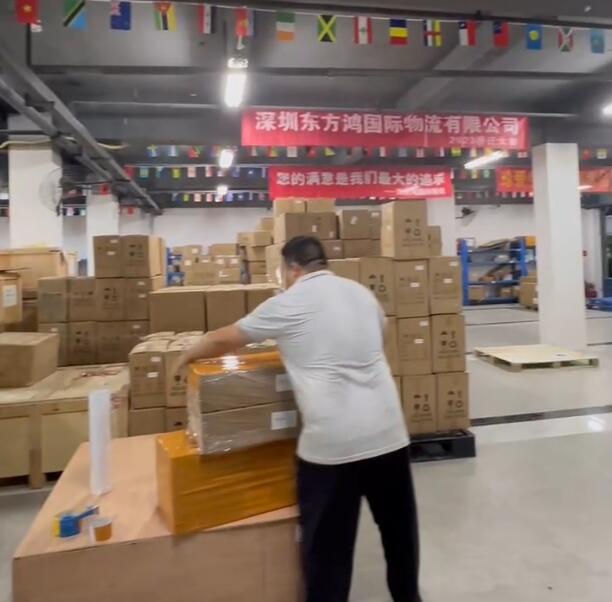
Factory packaging is usually not export-ready.
I’ve seen even high-value items arrive damaged simply because a supplier used a very thin carton.
In our warehouse, we:
- Replace weak cartons
- Reinforce packaging
- Add internal cushioning
- Repack to Amazon FBA standards
- Optimize dimensions to reduce freight costs
3. Photo and Video Checking
Before shipping, I always encourage importers to request:
- Photos of each carton
- Dimensions and weight
- Short videos for fragile or high-value items
This helps catch problems early—before they turn into costly disputes with suppliers.
4. Short-Term Storage
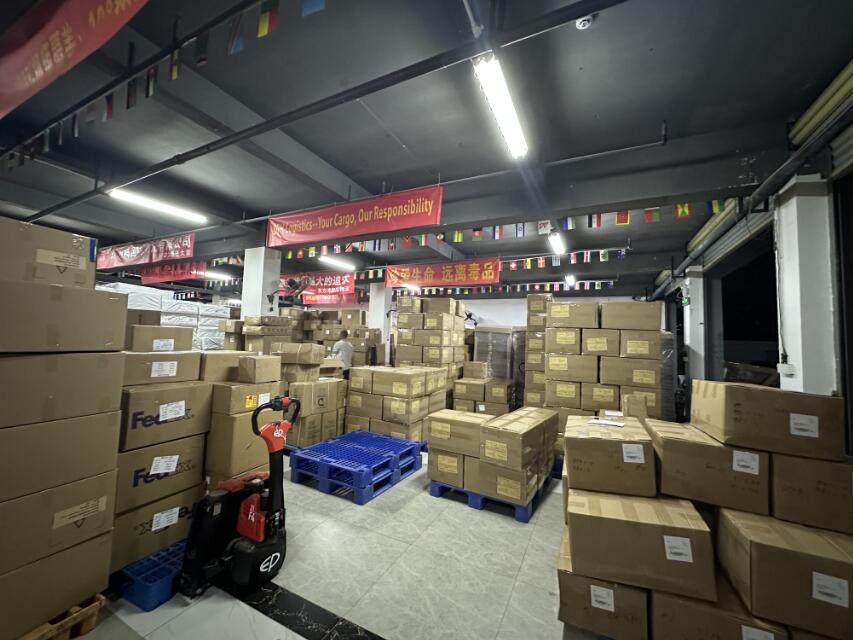
Guangzhou shipments often involve coordinating several suppliers.
To make this easier, we offer reasonable free storage periods while we wait for all goods to arrive for consolidation.
How Does DDP Shipping from Guangzhou Work?
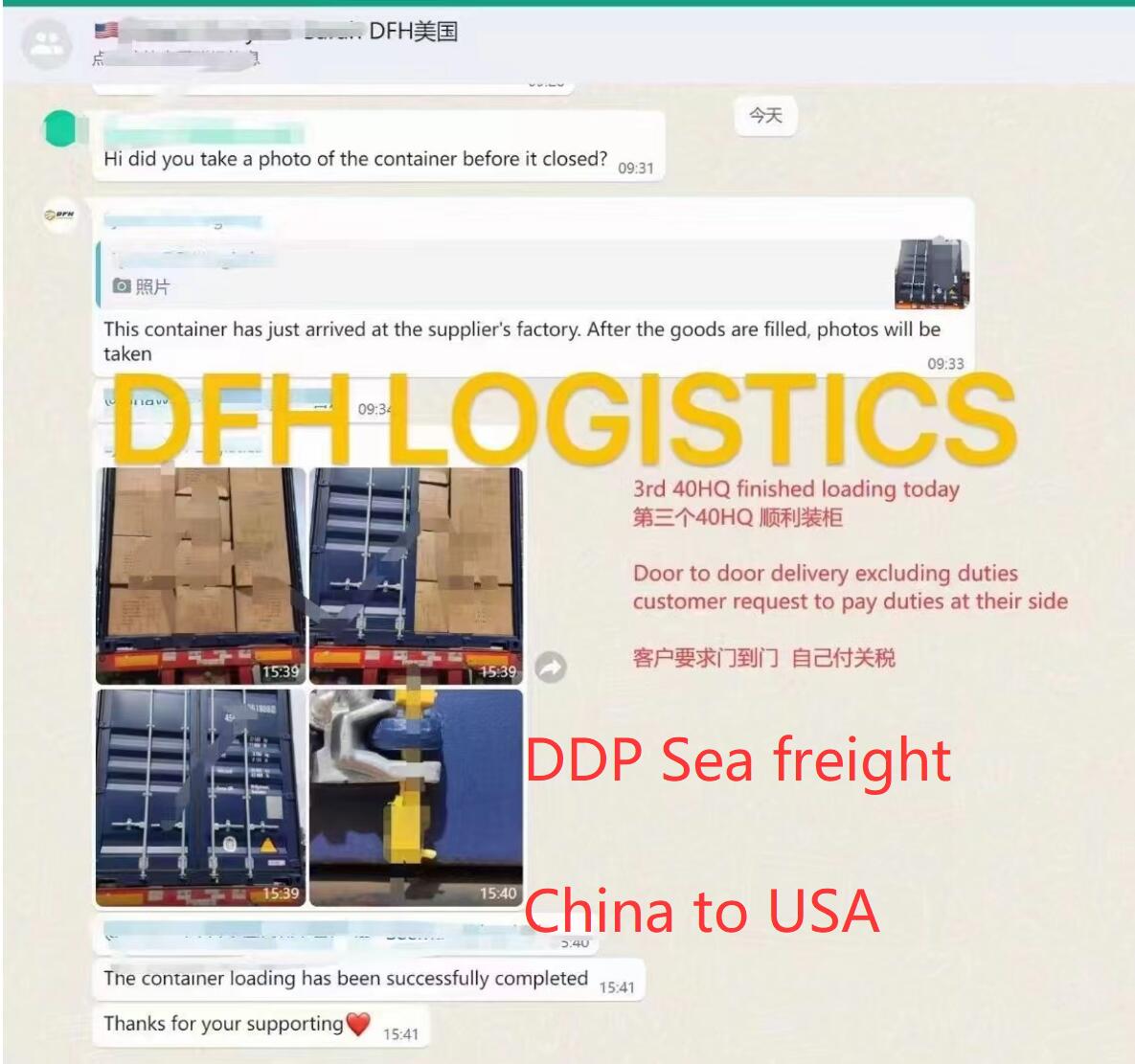
DDP shipping (Delivered Duty Paid) has become the go-to solution for many small businesses, first-time importers, and Amazon sellers. The reason is simple: it removes almost all responsibilities from the buyer.
With DDP:
- You don’t need an import license
- You don’t handle customs clearance
- You don’t pay duties separately
- You don’t coordinate last-mile delivery
- You don’t deal with brokers or forms
Everything is handled by us from start to finish.
Why Importers Prefer DDP
Most of my customers choose DDP because they want:
- A predictable total landed cost
- A door-to-door solution with no hidden fees
- Smooth customs entry
- Delivery to FBA warehouses
- A hands-off importing experience
For many e-commerce businesses, DDP is the most efficient way to scale.
DDP Shipping Time from Guangzhou
| Method | Transit Time | Suitable Cargo |
|---|---|---|
| DDP Air | 5–12 days | Small to medium-size shipments, electronics, accessories |
| DDP Sea | 22–40 days | Bulky items, furniture, home goods, large shipments |
DDP is most effective when you want predictable delivery and minimal involvement in the logistics process.
Read more: What is DDP Shipping?
How Does Export Customs Clearance Work in Guangzhou?
Export customs clearance is one of the areas where I see the most misunderstandings.
Guangzhou has well-established customs facilities, but like any major port, mistakes in documentation or HS codes can cause delays.
What Customs Checks During Export
- HS code accuracy
- Declared value
- Product category restrictions
- Invoice and packing list
- Export rights of the shipper
- Whether inspection is required
Many small suppliers or market sellers cannot declare exports themselves, so the freight forwarder must step in to complete the paperwork.
Common Issues I See—and Prevent
- Incorrect HS codes causing inspection
- Missing or mismatched information
- Supplier misreporting item quantities
- Specifying the wrong product name on documents
- Shipping goods that require special permits
A forwarder with deep experience in Guangzhou can usually identify these problems before they reach customs.
How Should You Choose a Reliable Freight Forwarder in Guangzhou?
Choosing a freight forwarder in Guangzhou shouldn’t feel like guesswork. Over the past twelve years, I’ve helped thousands of importers who first came to me after being overcharged, ignored, or left with stuck shipments because they worked with the wrong partner.
What I’ve learned is simple: you can identify a reliable Guangzhou freight forwarder in less than an hour—if you know what to check.
Below I’ll walk you through the exact steps I teach importers who want a smooth, stress-free shipping experience.
1. Confirm Whether They Truly Operate in Guangzhou
Many forwarders claim to operate in Guangzhou but actually handle shipments from another city.
This leads to:
- Higher inland trucking fees
- Slower pickups
- Poor supplier coordination
How to verify it:
Ask them for these three pieces of information:
Warehouse address in Guangzhou
- Real operational warehouses are usually in Baiyun, Haizhu, Huangpu, Panyu, or Foshan.
- If they hesitate or avoid giving a full address, that’s a red flag.
Photos or videos of their warehouse
- Look for loading docks, pallet jacks, working staff—real operations, not stock photos.
Pickup coverage map or confirmed districts
- A true Guangzhou forwarder will offer same-day or next-day pickup within Guangzhou and Foshan.
If they can’t provide these quickly, they’re not truly local.
2. Request a Fully Itemized Quote (Before You Ship Anything)
A reliable forwarder will never hide fees.
Before you ship, ask them to break down the price clearly:
- Pickup fee
- Export paperwork
- Freight cost
- Customs clearance
- Duty & tax (if DDP)
- Last-mile delivery
- Extra charges (battery fee, oversized fee, remote area delivery, etc.)
What I tell my clients:
“If the quote is one single number without explanation, reject it immediately.”
A professional quote should look like something you could show directly to your accountant.
3. Check Whether They Have Experience Shipping Your Type of Cargo
Different products need different channels, and many forwarders don’t understand the rules deeply.
For example:
- Electronics need battery-supported channels
- Cosmetics may require MSDS or special packaging
- Furniture needs reinforced packing and sturdy pallets
- Textiles often require volume-optimized cartons
- Tools, kitchenware, or metal goods require reliable LCL handling
Ask your forwarder:
“Show me one shipment you recently handled that is similar to mine.”
If they can explain:
- What they shipped
- Which channel they used
- What problems they handled
- The exact transit time
Then you know they’re competent.
If they answer vaguely (“No problem, we can do everything”), proceed with caution.
4. Test Their Communication Speed and Accuracy
Logistics runs on timing.
A slow-response freight forwarder = delayed pickups, delayed customs, delayed delivery.
Before working with them, test how they communicate:
- Do they reply within 30–60 minutes during working hours?
- Do they give specific answers, not generic phrases?
- Do they proactively explain risks or options?
- Do they confirm details in writing?
A reliable forwarder acts like your remote logistics department—not like a casual vendor.
5. Ask for at Least Two Shipping Plans, Not Just One
A professional Guangzhou freight forwarder will never push only one method.
They will give you options based on your priorities.
Tell them:
“Give me two plans: one fastest, one most economical.”
A good response should include:
- Transit time
- Total cost
- Pros and cons
- Size/weight limitations
- Whether import tax is included
- Risk factors (e.g., peak season surcharge, port delays)
If they can’t compare options clearly, they probably don’t have real route access.
6. Check Their Operational Process Step by Step
Instead of asking “Are you reliable?”, ask:
“Walk me through how you will handle my shipment from pickup to final delivery.”
A good forwarder will clearly explain:
- Pickup arrangement
- Warehouse check-in
- Carton measurement and weighing
- Consolidation (if multiple suppliers)
- Export declaration
- Loading or flight booking
- Customs clearance at destination
- Duty handling (if DDP)
- Final-mile delivery
When a company can articulate their workflow in detail,
you’re speaking with a professional—not a broker.
7. Verify Their History, Not Their Claims
Anyone can say they’ve been operating for 10 years.
Ask for evidence:
- Company registration information
- Case studies or sample waybills
- Photos of real shipments
- Customer reviews (even screenshots from WhatsApp)
- Records of FBA deliveries (if relevant)
You want a forwarder who has solved problems—not created them.
What I Tell Every Importer:
“If a forwarder can pass all seven checks above, you’ve already eliminated 90% of the risk.”
Most delays and hidden fees happen not because of bad luck,
but because importers unknowingly choose a forwarder who:
- Has no Guangzhou presence
- Lacks product-specific expertise
- Doesn’t communicate clearly
- Provides vague or incomplete pricing
- Can’t explain their own process
Follow this checklist, and you’ll know exactly who you can trust with your Guangzhou shipments.
Which Guangzhou Sourcing Areas Should Importers Be Aware Of?
Understanding Guangzhou’s sourcing geography helps you control pickup costs and plan consolidation more efficiently. After working with thousands of Guangzhou suppliers, I’ve mapped out the areas most importers source from—and how each location affects your logistics planning.
1. Baiyun District
Best known for:
- Clothing
- Bags
- Shoes
- Fashion accessories
This area is close to many logistics parks, which keeps pickup costs low. Most importers working with apparel factories or wholesale markets source from Baiyun.
2. Haizhu District (Canton Fair Area)
Known for:
- General merchandise
- International trading companies
- Exhibition sourcing
Haizhu suppliers usually respond faster and export more regularly, making the pickup process smoother.
3. Panyu District
Common products:
- Jewelry
- Crafts
- Gifts
Suppliers here are smaller studios or workshops. Packaging is often weak, so repacking at our warehouse is usually necessary.
4. Huangpu District
Known for:
- Machinery
- Industrial parts
- Electronics components
This area is closer to Huangpu Port, which helps reduce LCL inland costs.
5. Tianhe District
Mainly trading offices and e-commerce suppliers.
Pickup is fast because most suppliers here maintain ready stock.
6. Foshan (Near Guangzhou)
Important for:
- Furniture
- Lighting
- Construction materials
Foshan is only 40–60 minutes from many Guangzhou warehouses.
For bulky items, we often arrange pallet reinforcement before loading.
How Can You Get an Accurate Shipping Quote from Guangzhou?
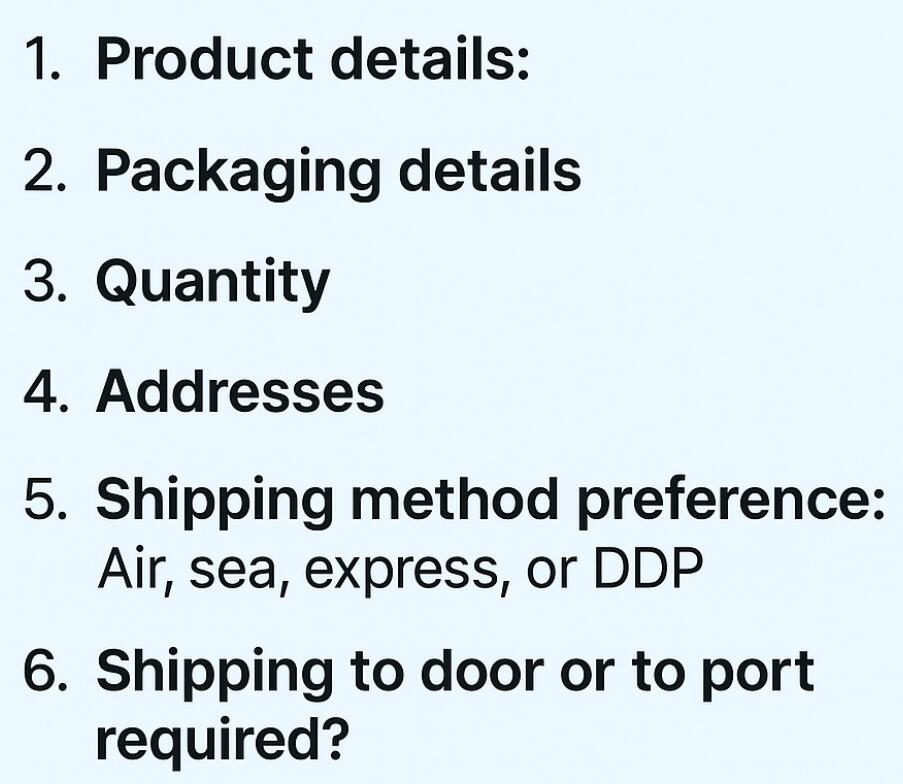
Importers often ask me why different freight forwarders provide such different prices.
The truth is, the accuracy of your quote depends heavily on the information you provide.
If you want a correct and reliable quote the first time, here’s what you need to prepare:
1. The Packing List Details
I need:
- Product name
- Quantity per item
- Carton count
- Dimensions (L×W×H in cm)
- Weight per carton
Accurate data ensures you won’t be charged extra later for discrepancies.
2. Supplier Address
Even within Guangzhou, pickup fees vary depending on:
- District
- Accessibility
- Warehouse loading conditions
For Foshan, Dongguan, or Shenzhen suppliers, providing detailed addresses helps plan the most cost-effective pickup route.
3. Preferred Shipping Method
Tell me your priorities:
- Fastest
- Cheapest
- E-commerce friendly
- Customs-compliant
- Suitable for batteries or liquids
This helps me filter out unsuitable channels immediately.
4. Delivery Address Type
- Residential
- Commercial
- Warehouse
- FBA center
Courier and DDP pricing differ based on the address type.
5. Your Budget or Time Expectations
For example:
- “Delivery to USA in under 10 days”
- “Most economical option for 20 CBM”
- “DDP only, no customs involvement”
Your goals determine the best channel.
What a Good Freight Forwarder Should Give You After This
A proper quote should include:
- Total cost
- Detailed cost breakdown
- Transit time
- Shipping method explanation
- Any limitations or special requirements
If a forwarder can’t provide this clearly, they’re not ready to handle your shipment.
What Common Shipping Problems Do Importers Face—and How Do I Solve Them?

After years of handling Guangzhou shipments, I’ve noticed that most importers run into the same problems repeatedly. The good news is: almost all of them are preventable with the right process.
Here are the most common issues and how I personally solve them:
Problem 1: Suppliers Deliver Goods at Different Times
My solution:
I coordinate with all your suppliers, track their delivery schedules, and only consolidate when everything arrives. Free storage helps avoid rushing decisions.
Problem 2: Weak Factory Packaging
It’s the number one cause of damage in shipment.
My solution:
At our Guangzhou warehouse, we check each carton and reinforce or replace weak packaging before loading.
Problem 3: Inaccurate Weight or Size Provided by Supplier
This leads to unexpected cost increases.
My solution:
We remeasure every carton ourselves and send you photos and videos for confirmation before shipping.
Problem 4: Incorrect HS Codes
This causes customs delays or seizure.
My solution:
I check your HS code, verify compliance, and correct documentation before export.
Problem 5: Supplier Has No Export License
Common in small factories and market sellers.
My solution:
We declare the export under our customs broker and handle all necessary documents.
Problem 6: Customs Delay at Destination
Often caused by paperwork mistakes.
My solution:
For DDP shipments, I handle customs clearance, duties, taxes, and all required documentation so you don’t get involved at all.
Problem 7: Wrong Labeling for Amazon FBA
This results in FBA rejection or extra fees.
My solution:
We verify and apply labels, comply with carton limits, and handle palletization according to FBA rules.
Why Is DFH Logistics the Best Freight Forwarder in Guangzhou?
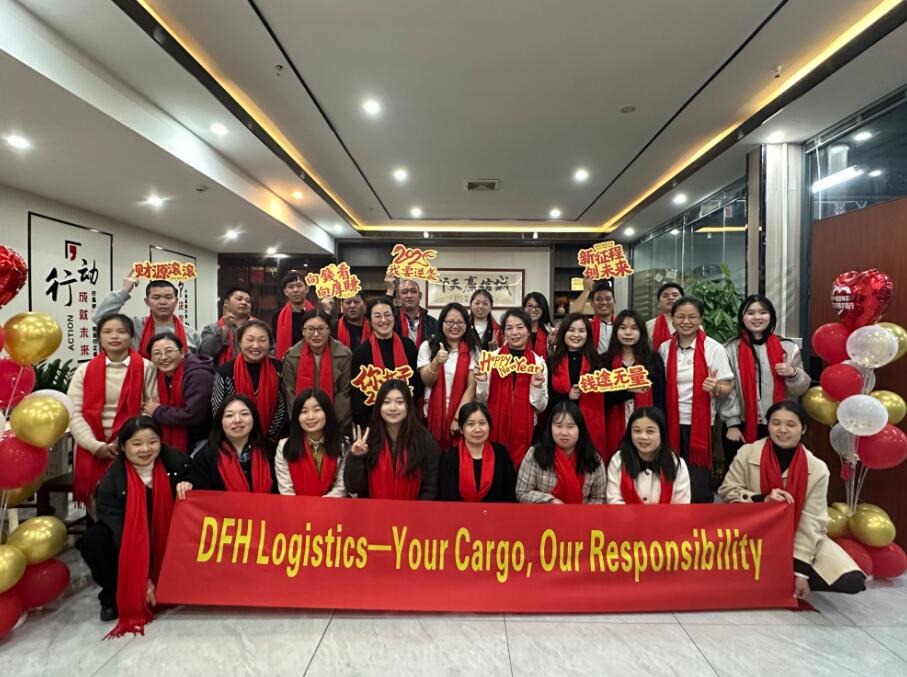
I’ve spent more than twelve years building DFH Logistics into a trusted partner for importers who source from Guangzhou.
Here’s why thousands of clients continue to choose us:
1. Full Coverage Across Guangzhou and Foshan
We pick up from:
- Baiyun
- Haizhu
- Tianhe
- Panyu
- Huangpu
- Foshan furniture markets
- Dongguan factories
- Shenzhen suppliers
Almost every Guangzhou-based supplier is within our daily route.
2. Strong Price Advantage
Because of our volume and long-term carrier partnerships, we secure:
- Better air freight rates
- Stable sea freight schedules
- Highly competitive DDP prices
Many clients switch to us simply because our total landed cost is more reasonable.
3. Real Guangzhou Warehouse + Professional Operations
We:
- Consolidate
- Repack
- Reinforce cartons
- Apply FBA labels
- Confirm quantities
- Provide photos and videos
Everything is done in-house by trained staff—not outsourced.
4. Expertise with All Product Types
We ship:
- Electronics (with batteries)
- Furniture
- Clothing
- Home goods
- Cosmetics
- Tools
- LED lighting
- Toys and seasonal items
This allows us to match your cargo with the correct, compliant channel every time.
5. DDP Specialists for the USA, UK, EU, Canada, Australia
Most importers want someone who can handle:
- Customs clearance
- Duties & taxes
- Final delivery
This is where DFH shines—we take care of everything.
6. Transparent Communication and Dedicated Support
My team updates clients proactively because I insist on it.
Every shipment gets:
- Clear timelines
- Real tracking updates
- Photos before dispatch
- Issue resolution at every step
You’re never left wondering where your goods are.
Conclusion
If you’ve already sourced products or have supplier details ready, I can create a customized shipping plan for you immediately.
Contact us now to get the best shipping price from Guangzhou to your country.

